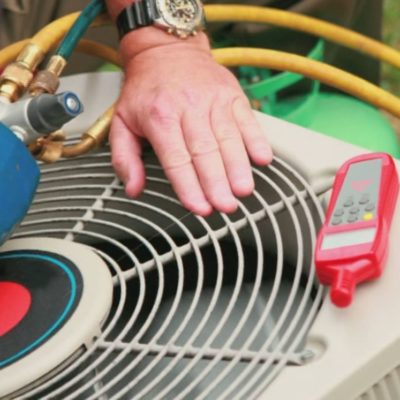Has your AC system been diagnosed with high suction pressure?
AC systems are designed to operate under pressure. As refrigerant travels between your AC system’s equipment, its pressure will increase and decrease.
High suction pressure, however, poses several problems that you can’t ignore.
What is High Suction Pressure?
High suction pressure is a phenomenon in which the refrigerant-carrying suction line of an AC system exceeds the pounds per square (PSI) for which it’s rated.
The suction line is the copper pipe that connects the evaporator coil to the condenser unit, the latter of which houses the condenser coil and the compressor.
While inside the suction line, refrigerant should be pressurized to about 65 to 75 PSI. As the low-pressure refrigerant travels through the suction line and to the compressor, its pressure will increase.
This increase in pressure will raise the temperature of the refrigerant, thus allowing it to release more heat at the condenser coil.
High suction pressure simply means the refrigerant’s PSI is higher than normal within the suction line.
Problems Caused By High Suction Pressure
With high suction pressure, your AC system may experience one or more problems.
Poor cooling is probably the most common symptom. High suction pressure will restrict your AC system’s ability to cool your home. The condenser coil may struggle to release heat stored within the refrigerant.
Your AC system may still turn on, but if it has high suction pressure, it may not provide sufficient cooling power. High suction pressure can lower the cooling power of your AC system.
Refrigerant must flow at a specific pressure through the suction line. If it’s too high, your AC system’s performance will suffer.
High suction pressure can damage certain parts of your AC system.
There’s a valve, for instance, within the suction line. If the suction line contains too much pressure, the valve may fail. High suction pressure can also strain the compressor. The compressor will have to work harder to compress and pump refrigerant through your AC system.
How to Fix High Suction Pressure
Since high suction pressure involves the suction line, you shouldn’t attempt to fix it yourself.
Handling refrigerant or refrigerant-carrying lines, such as the suction lines, requires the services of a professional heating, ventilation and cooling (HVAC) technician. Only HVAC technicians are trained to service suction lines.
By contacting an HVAC technician, you can get your AC system’s suction pressure back to normal levels.
If you are experiencing a problem with your air conditioning or heating call us at 512-336-1431 to schedule an appointment. We’ll be glad to come out and take a look at the issue.
1431-183 A/C & Heating proudly serves Round Rock, Georgetown, Cedar Park, Pflugerville, Leander, Liberty Hill, and North Austin.

